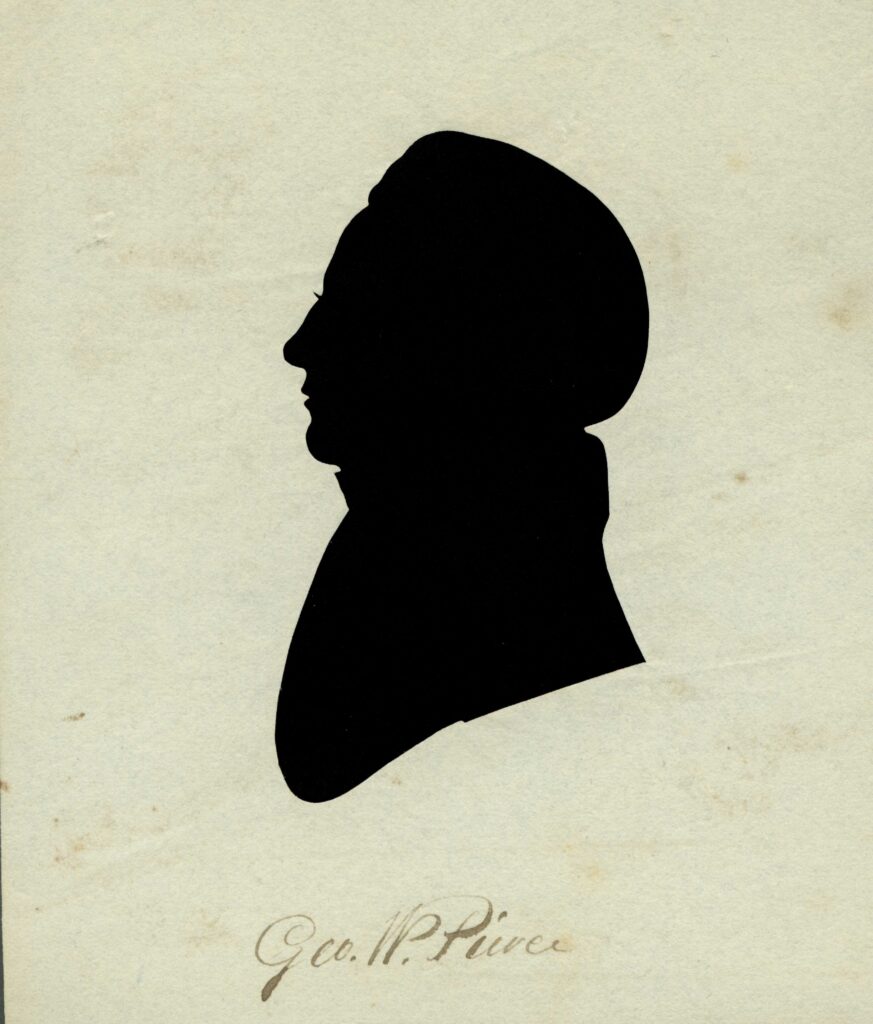
The Third Longfellow
George Washington Pierce was born at Baldwin, Maine, in 1805. His father, Josiah Pierce, was the descendant of one of Plymouth’s original families. His mother, Phebe Thompson, was the daughter of one of those killed at the battle of Lexington and Concord. George was the youngest of eleven siblings. As a child he was known for his precociousness and ability to make friends.
George had a private tutor for high school while also attending Fryeburg Academy and Thornton Academy. At Thornton Academy, he met James Ware Bradbury and David Shepley, who became his best friend.
When Pierce was fifteen his family sent him to Bowdoin. He spent his first year in Brunswick living at Captain R. Toppan’s with Shepley, Horatio Bridge, and Cullen Sawtelle. Pierce quickly found friends through college athletics and joining the Peucinian Society. The society’s disputations also gave him an outlet for his love of debate and writing. Pierce was soon recognized as one of the finest orators of his class and an expert in Belles Lettres. Every day he made a habit of writing a page essay on a topic of interest and spent his free time devouring English literature. However, Pierce’s reputation was not that of a stuffy scholar. Gorham Deane, Pierce’s classmate and friend, recounted his surprise upon returning to Bowdoin his freshman spring and discovering that Pierce had become part of an underground gambling group. George was apparently playing five hours of cards each day until Deane put a stop to it. This wasn’t Pierce’s only infraction as he received the occasional fine for neglecting work or skipping public worship.
Pierce continued to live with his friend Shepley during his three remaining years at Bowdoin. Sophomore year the pair boarded at Mrs. Greenleaf’s with Josiah Stover Little. The men went to Mrs. Adam’s their junior year before finally moving on campus to Maine Hall their senior year. Pierce graduated Bowdoin with respectable honors. At the Class Exhibition his junior fall he was chosen to lead a discussion with Nathaniel Dunn on “The Influence of Essay Writing on Taste and Morals.” He ranked eighth in the class at Commencement and participated in another discussion about “The Effects of the Late Struggles in Greece and South America on Literature and Liberty.” George Barrell Cheever was his partner and the pair were thought to be “well-matched.”
After graduating, Pierce decided to direct his energies towards the law. He studied for the profession under his brother and with the Longfellow family in Portland. Then Pierce was whisked away to a law school at Northampton, Massachusetts. He graduated there with high praise and many social connections, but suffering from illness he returned to his brother’s house in Gorham to recover. It was there that Pierce developed an ardent interest in politics. Watching Jackson’s 1828 campaign, he became a staunch Democrat and devoted himself to the election. After Jackson’s victory, Pierce decided to leave Maine and take a “western” tour. This brought him to St. Louis and the U. S. capitol where he met some of the nation’s most famous legislators. Returning to Maine in 1829, Pierce decided to officially begin his legal and political career. He opened a law office in Portland, started to ardently contribute to local political journals, and become a spokesperson for the Democratic party. In quick succession he was elected as a state legislator, county attorney, and city councilman. Pierce resolved himself to focus solely on his legal practice in 1834, but this ended with a prestigious appointment as the reporter of decisions for the Maine Supreme Court. At just 29, his professional future could not have been brighter.
Pierce’s personal life was just as interesting as his professional one. He spent much of his leisure time on athletics, honing his skills as a boxer and fencer. His other notable hobbies included learning French and acting. However, writing was always Pierce’s greatest passion and he missed no opportunity to practice. For example, when his classmate Alfred Mason passed away in 1828, Pierce wrote and published his eulogy. Similarly, when Pierce took a trip to explore the northern White Mountains in 1835, he sent the Portland newspapers accounts of his travels. Pierce’s partner in his endlessly busy life was his wife, Anne Longfellow. She was the sister of his classmates Henry and Stephen, and was well known for her upstanding character and musical talent. George likely met Anne when he was studying with the Longfellows in 1826, but the pair did not marry until 1832. By all accounts they had an extraordinarily happy marriage.
However, the Pierce’s marital bliss was not to last. Soon after their trip to the White Mountains, George fell ill with typhus fever. After battling the infection for a month, he passed away on November 15, 1835. Those around Pierce were stunned. Obituaries flooded the newspapers and Pierce was mourned by a wide circle of friends and colleagues. Anne never moved on from her husband’s death. She lived until 1901 but never remarried, instead reminiscing on “the happiness of that union & the excellence of his character.” Her long life spent devoted to her husband shows the impact that he left behind.